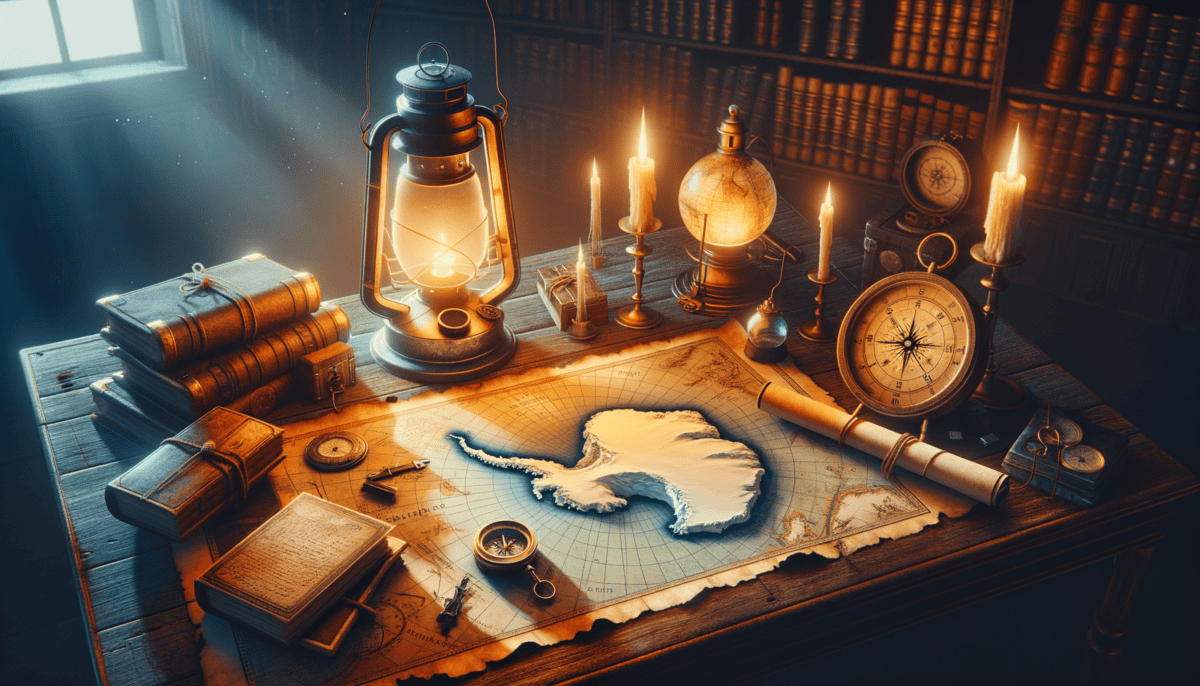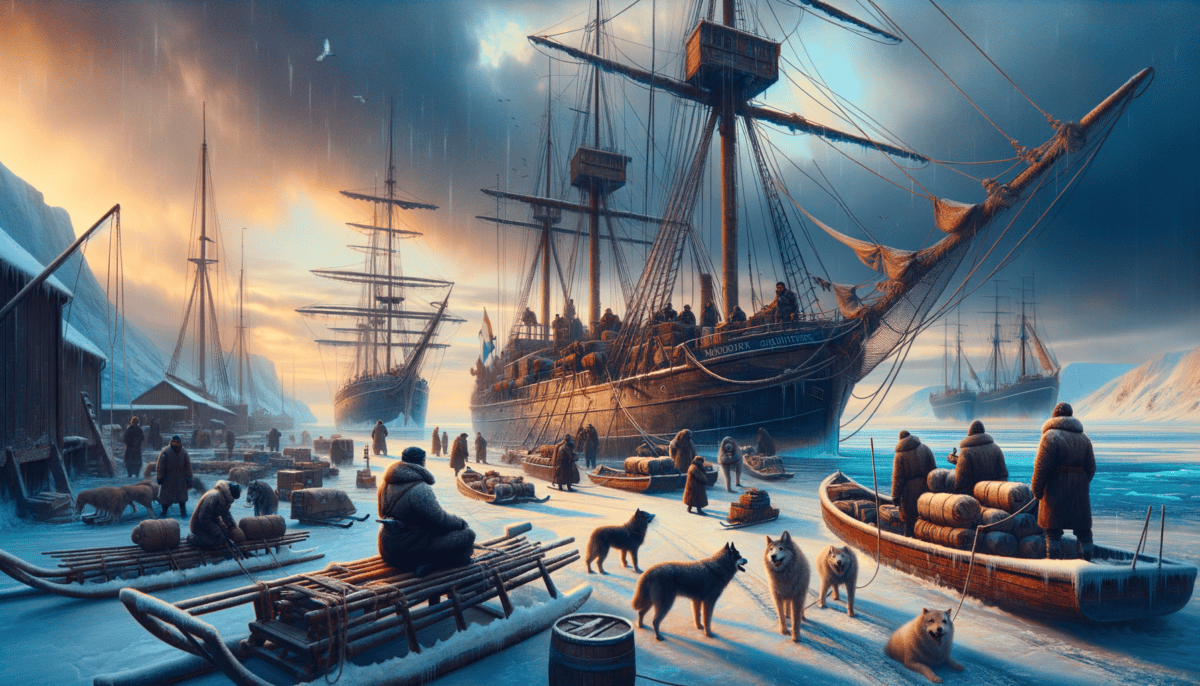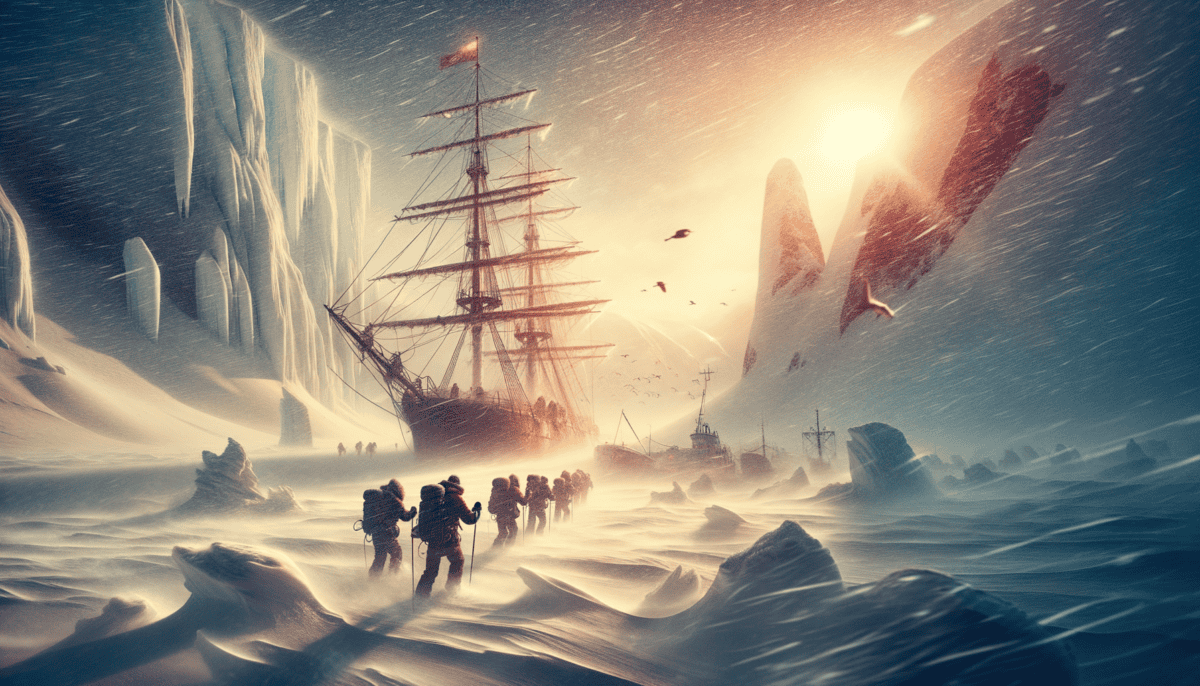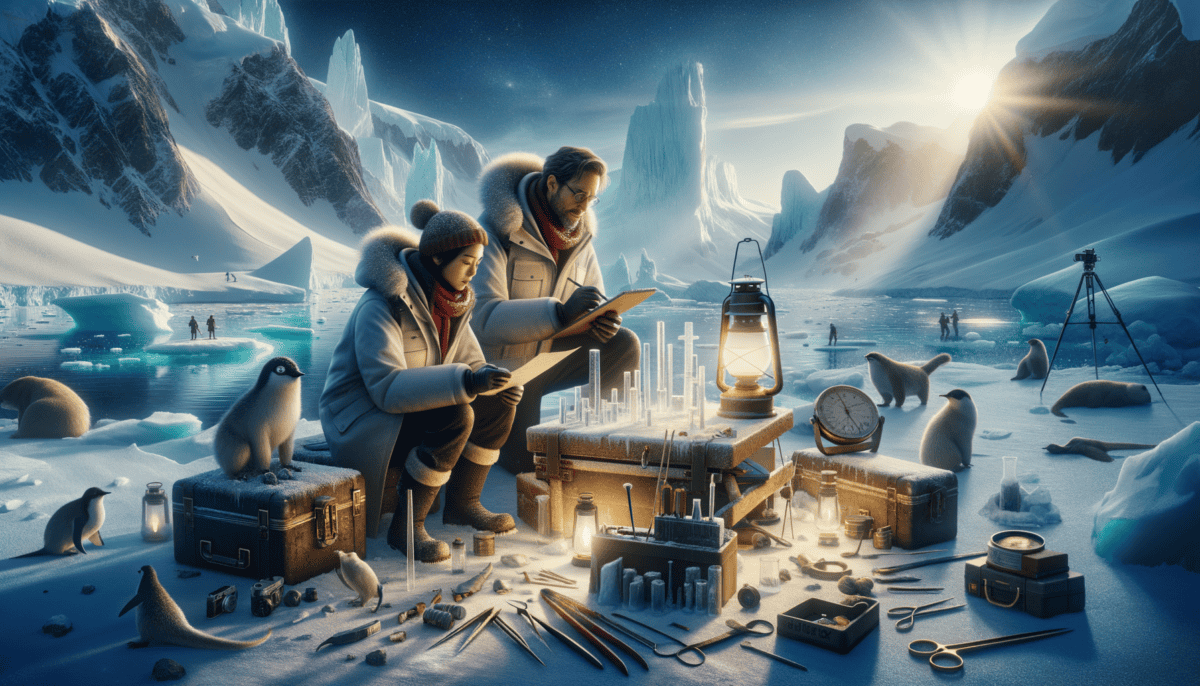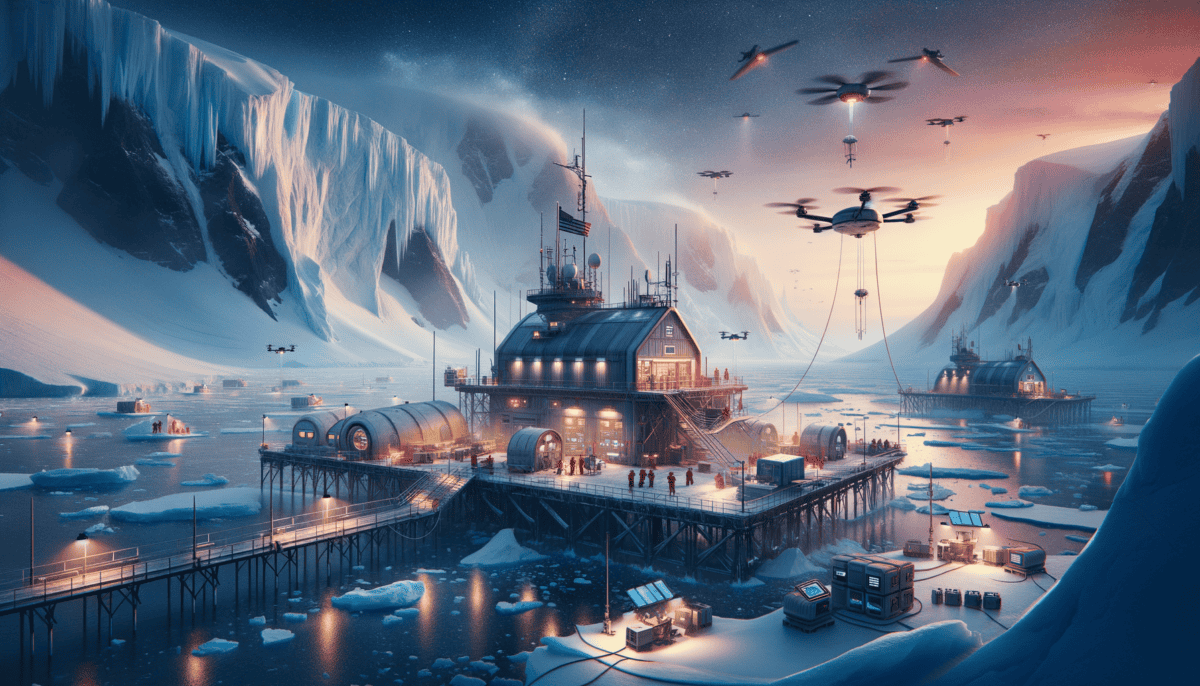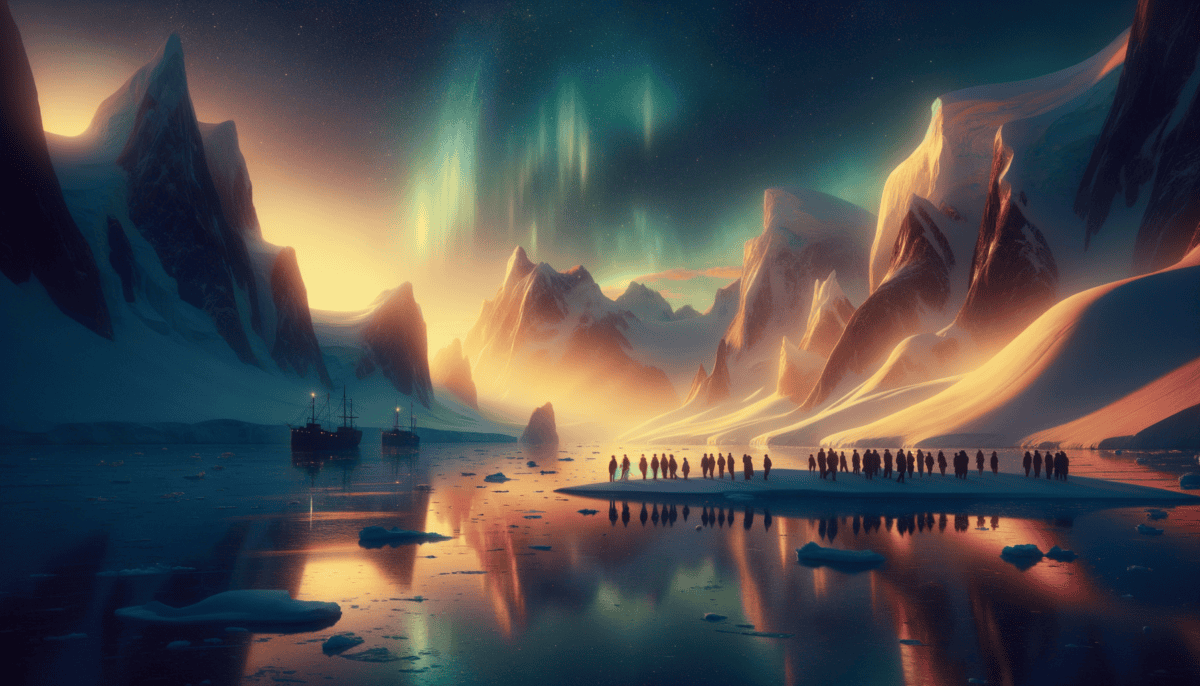The Calling of the Unknown
❄️ A long, long time ago, before anyone knew what was at the bottom of our world, people wondered about a mysterious land called Antarctica. They looked at maps and saw a big empty space. "What could be down there?" they asked. Some thought there might be dragons! Others dreamed of hidden treasures.
Little Timmy sat by the fireplace, listening to his grandfather's tales of the great unknown south. "But Grandpa, why didn't anyone just go and look?"
His grandfather smiled and pulled out an old, yellow map. "It wasn't that simple, Timmy. The journey was very dangerous. The seas were rough, with waves as tall as buildings! ⚓"
The brave sailors who first tried to find Antarctica faced big problems. The water turned to ice, making it hard for ships to move. The wind blew so strong it could tear sails apart. But these problems didn't stop them from trying!
"Were they scared, Grandpa?" Timmy asked, his eyes wide with wonder.
"They were brave, but yes, sometimes they were scared. The cold was their biggest enemy. It was so cold that water turned to ice in seconds! "
Early Dreams and Ideas
Scientists got very excited about exploring Antarctica. They wanted to learn about:
- The weather
- The ice
- The animals
- The land under all that snow
"But the most amazing thing," Grandpa continued, "was how everyone worked together. People from different countries joined forces to solve the mystery of Antarctica."
Getting ready for Antarctic trips was like preparing for a journey to another planet. Explorers needed special clothes to stay warm. They packed lots of food that wouldn't freeze. They brought strong ropes, warm sleeping bags, and special maps.
"The ships had to be super strong," Grandpa explained, tapping on the table. "Normal boats would break in the ice. They built special ships with thick wooden sides to push through the frozen sea."
Timmy leaned forward, completely caught up in the story. "Did they find what they were looking for?"
"Well," Grandpa said with a twinkle in his eye, "that's where our story gets really interesting. The first explorers found something better than dragons or treasure. They found a whole new world of ice and snow, where the sun sometimes shines at midnight and where the ground is white as far as you can see."
The early dreams of Antarctica were full of hope and wonder. Some people thought they might find warm valleys hidden between the ice. Others hoped to discover new kinds of animals no one had ever seen before.
"You see, Timmy," Grandpa said, pointing to the old map, "sometimes the biggest adventures start with just asking questions. These brave explorers showed us that with enough courage and hard work, we can solve any mystery."
A cold wind whistled outside the window, making the flames dance in the fireplace. Timmy pulled his blanket closer, imagining those first brave sailors facing the freezing Antarctic winds. Their story was just beginning, and already he couldn't wait to hear what happened next.
The Great Polar Race
The year was 1911, and two brave teams were getting ready for the biggest race ever! ♂️ They wanted to be the first people to reach the South Pole – the very bottom of Earth.
“Who’s going to win, Grandpa?” Timmy asked, bouncing with excitement.
“Well,” Grandpa said, pulling out an old photo, “there were two teams. One was led by Roald Amundsen from Norway, and the other by Robert Scott from England.”
Amundsen was smart about planning his trip. He watched how the Inuit people lived in the cold and learned from them. He chose warm fur clothes and lots of dogs to pull the sleds.
“Dogs are good in the snow, right Grandpa?” Timmy patted his own dog, Max.
“That’s right! And Amundsen brought 52 dogs with him. Can you imagine that many dogs?”
Two Different Ways
Scott’s team tried something different. They used horses and motor sleds. But the motors didn’t work well in the cold, and the horses had trouble walking in deep snow.
Both teams faced big problems:
- Super cold winds that felt like ice
- Deep snow that made walking hard
- Huge cracks in the ice called crevasses
- Days with no sun at all
“It was like walking through a giant freezer,” Grandpa explained. “The wind was so strong it could knock you over!”
The Race Gets Tough
Amundsen’s team moved fast on their skis. They had practiced a lot and knew exactly what to do. Every night, they built snow houses called igloos to stay warm.
“Scott’s team had troubles,” Grandpa said sadly. “Their food got too cold to eat. Their clothes weren’t warm enough. And they got very, very tired.”
Timmy hugged his blanket closer. “That sounds scary!”
“It was. But both teams were very brave. They kept going even when things got really hard.”
The Big Moment
On December 14, 1911, something amazing happened. Amundsen’s team made it to the South Pole! They planted a flag and left a tent with a letter inside.
“What did the letter say?” Timmy asked.
“It was for Scott, telling him that Amundsen’s team had made it first. Scott’s team reached the South Pole 34 days later.”
“The race to the South Pole taught us a lot,” Grandpa said, closing his photo album. “It showed us how important it is to plan carefully and learn from others who know about snow and ice.”
Timmy looked out the window at the falling snow. He imagined being there with those brave explorers, facing the fierce Antarctic winds and endless fields of ice. The great race might have ended, but the story of Antarctica was far from over.
Survival Against Impossible Odds
The bitter wind howled across the frozen landscape. ❄️ Little Sarah pulled her blanket tighter as her grandmother continued the incredible story of Antarctic survival.
“What happened to Scott’s team after they reached the South Pole, Grandma?” Sarah asked, her eyes wide with wonder.
“The journey back was very hard,” Grandma said softly. “The team faced the worst weather ever seen in Antarctica. The wind felt like tiny ice needles on their faces.”
Fighting the Elements
Every step was a battle. The explorers pulled their heavy sleds through deep snow. Their food was frozen solid. Even their breath turned to ice!
“How did they find their way, Grandma?” Sarah clutched her stuffed penguin.
“They used special tools called compasses, but the fierce storms made it hard to see. Sometimes they walked in circles without knowing it!”
- Blizzards that lasted for days
- Hidden ice cracks bigger than houses
- Running out of food
- Frostbite that could freeze fingers and toes
The Test of Human Spirit
“One explorer named Douglas Mawson had the scariest adventure of all,” Grandma continued. “He fell into a deep ice crack, but his rope caught him!”
Sarah gasped. “Was he okay?”
“He pulled himself up, rope by rope, even though his hands were freezing. He never gave up!”
Brave Choices
The explorers helped each other. When someone got too tired, others would share their food. They told stories to stay happy when the dark winter came.
“The worst enemy wasn’t the cold,” Grandma explained. “It was giving up hope. But these brave people kept going, one step at a time.”
Heroes in the Ice
Ernest Shackleton was another brave explorer. His ship got stuck in ice, but he saved his whole team! He sailed a tiny boat through giant waves to get help.
“He sounds like a superhero!” Sarah bounced excitedly.
“He was! And do you know what he said? ‘Better a live donkey than a dead lion.’ It means it’s better to be safe than sorry.”
Sarah looked at her globe, spinning it to find Antarctica. “Those explorers were so brave, Grandma. Did their adventures help us learn about Antarctica?”
“Yes, sweet pea. Every step they took, every challenge they faced, taught us something new about this amazing frozen land. And there was still so much more to learn!”
Outside, snowflakes danced in the evening light, reminding them of the endless white landscapes where brave explorers had battled impossible odds. The story of Antarctic survival would continue to inspire people for generations to come.
Secrets of the Ice
Sarah’s eyes sparkled as her grandmother pulled out a big science book. “Remember those brave explorers we talked about? They found amazing things under all that ice!”
Hidden Treasures
“What did they find, Grandma?” Sarah leaned forward eagerly.
“Well, first they found mountains bigger than Mount Everest – but they were hiding under the ice! Can you imagine that?” ️
Amazing Animals
“The explorers met some very special animals too,” Grandma smiled. “Like penguins that can swim faster than you can run!”
“Really? What else did they see?” Sarah hugged her toy penguin tighter.
“They found seals that can dive deeper than any submarine. And tiny creatures that don’t freeze even when the water turns to ice!”
- Emperor Penguins that keep their eggs warm in -60°F weather
- Weddell seals that can hold their breath for an hour
- Snow petrels that fly in the worst storms
- Tiny krill that feed whales
Weather Watchers
“Scientists built special houses in Antarctica,” Grandma explained. “They’re like weather stations that tell us about Earth’s climate.”
“How do they work?” Sarah asked.
“They use computers and satellites to study the ice. The ice is like Earth’s diary – it tells us stories about weather from long ago!”
New Tools, New Discoveries
“Today’s explorers have special robots that can go under the ice,” Grandma showed Sarah a picture. “They’re like underwater cameras with arms!”
“That’s so cool! Can the robots talk to the fish?” Sarah giggled.
“Not quite, but they can take pictures and collect samples. They help us learn about life under the ice.”
Mystery Rocks
“The scientists even found special rocks in Antarctica,” Grandma pulled out a shiny black stone. “Some came from space – they’re meteorites!”
Sarah held the rock carefully. “From space? Like from Mars?”
“Yes! The white ice makes it easy to spot these dark space rocks. It’s like a treasure hunt!” ☄️
“Would you like to see what the scientists are finding right now?” Grandma asked, opening her laptop.
“We can do that?” Sarah bounced excitedly.
“Yes! Many research stations share their discoveries online. Let’s see what’s new today in Antarctica!”
As they looked at the latest pictures from the frozen continent, Sarah realized that Antarctica still held many secrets waiting to be discovered. The adventure of exploration was far from over.
The Changing Face of Antarctica
Sarah and her grandmother huddled over a new set of photos on the laptop. “Antarctica looks different now than when those first explorers went there,” Grandma explained. ️
A World of Change
“The ice is changing, dear. It’s like when your popsicle melts in the sun, but much, much bigger,” Grandma said softly.
“Is the ice sick?” Sarah asked, touching the screen gently.
“Not sick, but it needs our help. Scientists from all over the world work together to understand what’s happening.”
Modern Day Heroes
“Today’s explorers are different from the old ones,” Grandma showed Sarah a video of scientists in bright orange suits.
“They have better clothes!” Sarah giggled.
“And better tools too! They use special robots, computers, and even satellites to study the ice.” ️
- Ice-drilling machines that go deep into glaciers
- Weather balloons that fly high in the sky
- Underwater robots that explore beneath the ice
- Special cameras that can see through snowstorms
Protecting Penguin Homes
“Look at these baby penguins,” Grandma pointed to a live webcam feed. “Scientists are helping protect their homes.”
Sarah watched the fluffy chicks waddle around. “How do they help them?”
“They make sure nobody bothers the penguins. They also study how warming changes their habitat.”
New Discoveries
“Scientists find new things in Antarctica every day,” Grandma explained, showing Sarah a news article.
“What did they find today?” Sarah asked excitedly.
“They discovered tiny plants that can live in the coldest ice! And they’re learning how seals and whales find food under the frozen ocean.”
Sharing the Story
“Now scientists can share what they learn right away,” Grandma said, showing Sarah a live video from an Antarctic research station.
“Can we watch the scientists work?” Sarah asked.
“Yes! Many stations have cameras that let us see what’s happening right now. We can be part of the discovery!”
“I want to be a scientist when I grow up,” Sarah declared. “I want to help protect Antarctica!”
Grandma smiled warmly. “That’s wonderful! The more we learn about Antarctica, the better we can take care of it. Maybe someday you’ll make an important discovery there too.”
“Can we look at more scientist blogs?” Sarah asked, eager to learn more.
“Of course! There’s always something new to discover about this amazing frozen world.”
A Legacy of Ice and Discovery
Sarah bounced excitedly in her chair. “What happened to all those scientists and their discoveries, Grandma?”
“Their work changed how we see Antarctica forever, dear. Let me show you something special.” Grandma pulled out a shimmering globe. ✨
A World United by Ice
“See this white part at the bottom? That’s Antarctica. In 1959, something amazing happened,” Grandma traced her finger over the continent.
“What happened?” Sarah leaned closer.
“All the countries in the world made a promise. They said Antarctica doesn’t belong to any one country – it belongs to science and peace!” ️
Treasures in the Ice
“Scientists found so many treasures in Antarctica,” Grandma explained, showing Sarah pictures on her tablet.
“Like gold?” Sarah asked.
Grandma chuckled. “Even better! They found old air trapped in ice bubbles that tells us about Earth’s past. They discovered meteorites from space. And they found new kinds of life that can survive in the coldest places!”
• Tiny creatures that live in super salty lakes under the ice
• Ancient forests frozen in time
• New types of penguins and seals
• Colorful underwater worlds beneath the ice
• Clues about how Earth’s climate changed over time
Guardians of the Ice
“What about the ice, Grandma? Is it still melting?” Sarah’s voice was worried.
“Yes, dear. But remember those scientists we learned about? They’re like guardians of Antarctica. They study the ice to help protect it.” ️
“Scientists from all over the world work together in Antarctica. They share their findings and help each other, just like a big family.”
Dreams of Tomorrow
Sarah picked up her penguin stuffed animal. “I still want to go there someday.”
“Antarctica needs people like you, Sarah. People who care and want to learn more.” Grandma smiled warmly.
“Maybe I’ll discover something new!” Sarah’s eyes sparkled with excitement. ⭐
The Story Continues
“Is that the end of Antarctica’s story?” Sarah asked, closing the photo album.
Grandma shook her head. “No, dear. Antarctica’s story is still being written. Every day, brave scientists make new discoveries. Every day, we learn more about protecting this special place.”
Sarah hugged her grandmother tight. “Thank you for teaching me about Antarctica, Grandma.”
“Remember, Sarah, Antarctica isn’t just a frozen continent at the bottom of the world. It’s a place that brings people together, teaches us about our planet, and shows us how amazing science can be.”
As they looked at the glowing globe one last time, Sarah knew that Antarctica’s greatest chapters were yet to come – and maybe, just maybe, she would help write them. ✨

